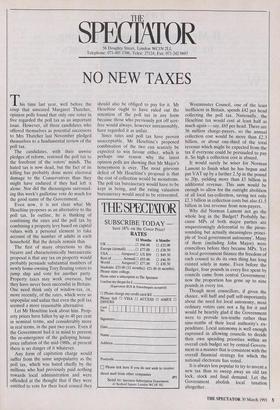SPECTAT Imj OR
56 Doughty Street, London WC1N 2LL Telephone: 071-405 1706; Telex: 27124; Fax: 071-242 0603
NO NEW TAXES
This time last year, well before the coup that unseated Margaret Thatcher, opinion polls found that only one voter in five regarded the poll tax as an important issue. However, all three candidates who offered themselves as potential successors to Mrs Thatcher last November pledged themselves to a fundamental review of the poll tax.
The candidates, with their unwise pledges of reform, restored the poll tax to the forefront of the voters' minds. The hated tax is now dead, but the fact of its killing has probably done more electoral damage to the Conservatives than they might have endured if they had left it alone. Nor did the shenanigans surround- ing this week's guillotine vote do much for the good name of the Government. Even now, it is not clear what Mr Heseltine proposes as an alternative to the poll tax. In outline, he is thinking of combining the rates and the poll tax by combining a property levy based on capital values with a personal element to take account of the number of adults in each household. But the details remain thin.
The first of many objections to this bizarre and characteristically bureaucratic proposal is that any tax on property would probably persuade substantial numbers of newly home-owning Tory floating voters to jump ship and vote for another party. Property taxes may work overseas, but they have never been successful in Britain. One need think only of window-tax, or, more recently, of the rates, which were so unpopular and unfair that even the poll tax seemed a more reasonable alternative.
Let Mr Heseltine look about him. Prop- erty prices have fallen by up to 40 per cent in nominal terms, and considerably more in real terms, in the past two years. Even if the Government had it in mind to prevent the re-emergence of the galloping house- price inflation of the mid-1980s, at present there is no danger of it whatever.
Any form of capitation charge would suffer from the same unpopularity as the poll tax, which was hated chiefly by the millions who had previously paid nothing towards local administration and were offended at the thought that if they were entitled to vote for their local council they should also be obliged to pay for it. Mr Heseltine ought to have ruled out the retention of the poll tax in any form because those who previously got off scot- free would always, however unreasonably, have regarded it as unfair.
Since rates and poll tax have proven unacceptable, Mr Heseltine's proposed combination of the two can scarcely be expected to win favour either, which is perhaps one reason why the latest opinion polls are showing that Mr Major's honeymoon is over. The most grievous defect of Mr Heseltine's proposal is that the cost of collection would be monstrous. The poll tax bureaucracy would have to be kept in being, and the rating valuation bureaucracy would need to be reinvented. Westminster Council, one of the least inefficient in Britain, spends £42 per head collecting the poll tax. Nationally, the Heseltine tax would cost at least half as much again — say, £65 per head. There are 36 million charge-payers, so the annual collection cost would be more than £2.3 billion, or about one-third of the total revenue which might be expected from the tax if everyone could be persuaded to pay it. So high a collection cost is absurd.
It would surely be wiser for Norman Lamont to finish what he has begun and put VAT up by a further 2.5p in the pound to 20p, yielding more than £5 billion in additional revenue. This sum would be enough to allow for the outright abolition of all local tax-collection, saving not only £2.3 billion in collection costs but also £1.5 billion in lost revenue from non-payers.
Why did Norman Lamont not go the whole hog in the Budget? Probably be- cause MPs of both major parties are unquestioningly deferential to the pious- sounding but actually meaningless princi- ple of 'local government autonomy'. Many of them (including John Major) were councillors before they became MPs. Yet in local government finance the freedom of each council to do its own thing has long existed solely in name. Even before the Budget, four pounds in every five spent by councils came from central Government: now the proportion has gone up to nine pounds in every ten.
Though most councillors, if given the chance, will huff and puff self-importantly about the need for local autonomy, most ordinary voters care not a fig for it and would be heartily glad if the Government were to provide ten-tenths rather than nine-tenths of their local authority's ex- penditure. Local autonomy is well enough expressed in allowing councils to decide their own spending priorities within an overall cash budget set by central Govern- ment in a manner that is consistent with the overall financial strategy for which the national electorate has voted.
It is always less popular to try to invent a new tax than to sweep away an old tax lock, stock and final demand. Let the Government abolish local taxation altogether.


















































 Previous page
Previous page